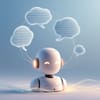The growing trend of using AI chatbots, like ChatGPT, for mental health support has sparked both interest and concern. While some people are turning to these tools for therapy, experts warn that AI is not a replacement for human therapists.
AI chatbots can offer immediate support and anonymity, which may be appealing to those who struggle to access traditional therapy. However, concerns arise about the lack of human empathy, potential biases in AI algorithms, and the risk of misdiagnosis or inadequate support.
Mental health professionals emphasize the importance of human connection and empathy in therapy, which AI systems currently cannot replicate. They also highlight the need for rigorous testing and validation of AI chatbots before they can be considered a viable supplement to traditional therapy.
As AI technology advances, it's likely that chatbots will become more sophisticated and potentially play a larger role in mental health support. However, it's crucial to approach this development with caution, prioritizing human well-being and ensuring that AI systems are designed to complement, rather than replace, human therapists.
Ultimately, while AI chatbots may offer some benefits, they should not be seen as a substitute for professional human therapy. Instead, they might serve as a stepping stone or supplementary tool for those seeking mental health support, under the guidance of qualified professionals.


